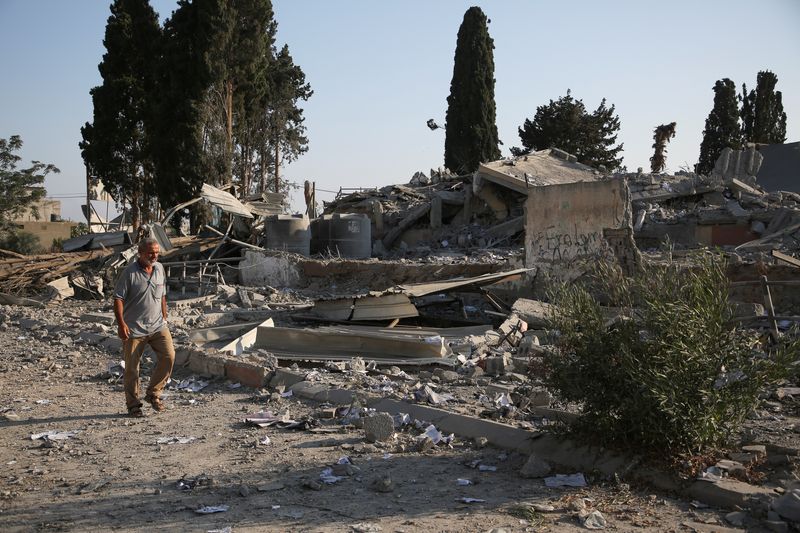Girl dies of malnutrition in Gaza as Israel bombs north and south
2024.06.27 05:19
By Nidal al-Mughrabi
CAIRO (Reuters) – Another child died of malnutrition in northern Gaza overnight and six people were killed and several wounded in renewed Israeli bombing of residential areas of Gaza City, Palestinian health officials said on Thursday.
In the southern city of Rafah, a one-time place of refuge where Israel says it is close to completing an almost month-long operation against Hamas fighters, residents said the military had flattened several districts over the past few days.
More than eight months into Israel’s war on Gaza triggered by the Hamas-led cross border attack on Oct. 7, aid officials say the enclave remains at high risk of famine, with almost half a million people facing “catastrophic” food insecurity.
“We are being starved in Gaza City, and are being hunted by tanks and planes with no hope that this war is ever ending,” Mohammad Jamal, 25, a resident of Gaza City, told Reuters via a chat app.
The death of another girl in Kamal Adwan Hospital late on Wednesday raised the number of children who have died of malnutrition and dehydration to at least 31, a health official said, adding that the war made recording such cases difficult.
Israel denies accusations it has created the famine conditions, blaming aid agencies for distribution problems and accusing Hamas of diverting aid, allegations the militants deny.
Palestinian health officials said three people had been killed when Israeli planes bombed five residential buildings in the Sabra neighbourhood in Gaza City. Rescue teams are searching for others trapped under the rubble, while three other people were killed in the nearby Shejaia neighbourhood.
“It sounded as if the war is restarting, a series of bombings that destroyed several houses in our area and shook the buildings,” resident Jamal said.
Drone footage on social media, which Reuters could not immediately authenticate, showed dozens of houses destroyed in parts of Rafah, which borders Egypt, with the Swedeya village on the western side of the city completely wiped out.
There was no immediate Israeli military comment on the overnight military action.
US AND ISRAEL DISCUSS POST-WAR PLAN FOR GAZA
International mediation backed by the U.S. has failed to yield a ceasefire agreement although talks are continuing amid intense Western pressure for Gaza to receive more aid.
Israeli Defense Minister Yoav Gallant said on Wednesday that he had discussed his proposals for governance of post-war Gaza that would include local Palestinians, regional partners and the U.S. but that it would be “a long and complex process”.
Senior U.S. officials told Gallant, who was visiting Washington, that the U.S. would maintain a pause on a shipment of heavy munitions for Israel while the issue is under review. The shipment was paused in early May over concerns the weapons could cause more Palestinian deaths in Gaza.
Hamas says any deal must bring an end to the war and full Israeli withdrawal from Gaza, while Israel says it will accept only temporary pauses in fighting until Hamas, which has ruled Gaza since 2007, is eradicated.
When Hamas-led militants stormed into southern Israel on Oct. 7, they killed around 1,200 people and seized more than 250 hostages, according to Israeli tallies.
The Israeli offensive in retaliation has so far killed 37,658 people, the Gaza health ministry said on Tuesday, and has left the tiny, heavily built-up Gaza Strip in ruins.
The Gaza health ministry does not distinguish between combatants and non-combatants, but officials say most of those killed have been civilians. Israel has lost 314 soldiers in Gaza and says at least a third of the Palestinian dead are fighters.

Along with food shortages that mean most of Gaza’s 2.3 million population goes hungry, a lack of clean water and sanitation is spreading disease.
An Israeli security official and a Western official told Reuters on Wednesday that Israel is preparing to boost electricity to a desalination plant so it can produce more water for Gaza. The Western official said the plan would alleviate the problem but solving it would require repairs.
(Reporting and writing by Nidal al-Mughrabi; editing by Philippa Fletcher)








